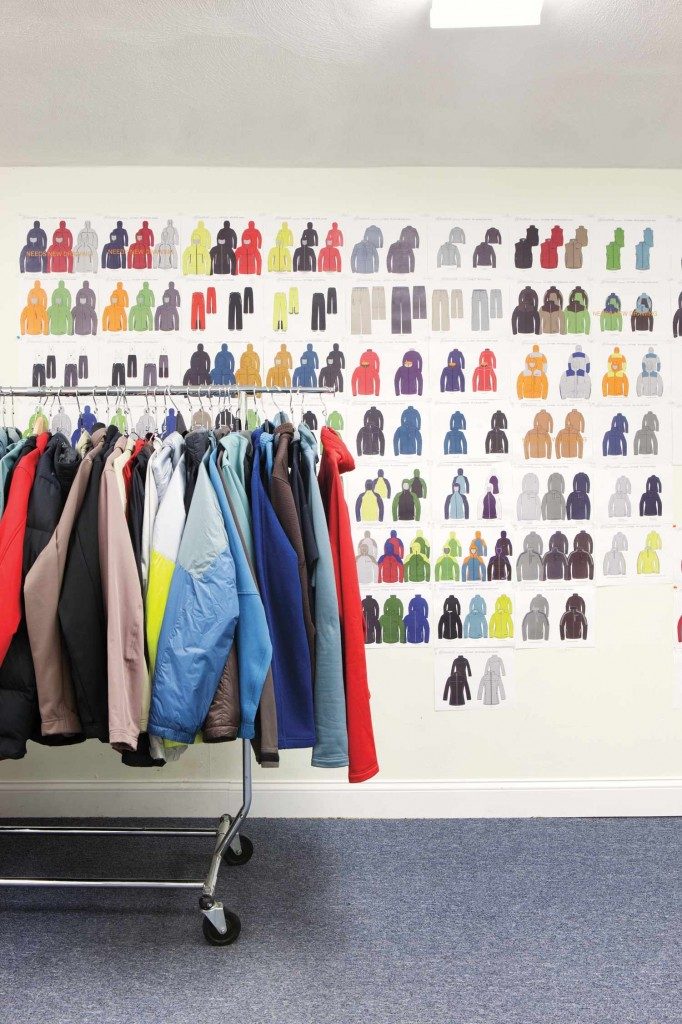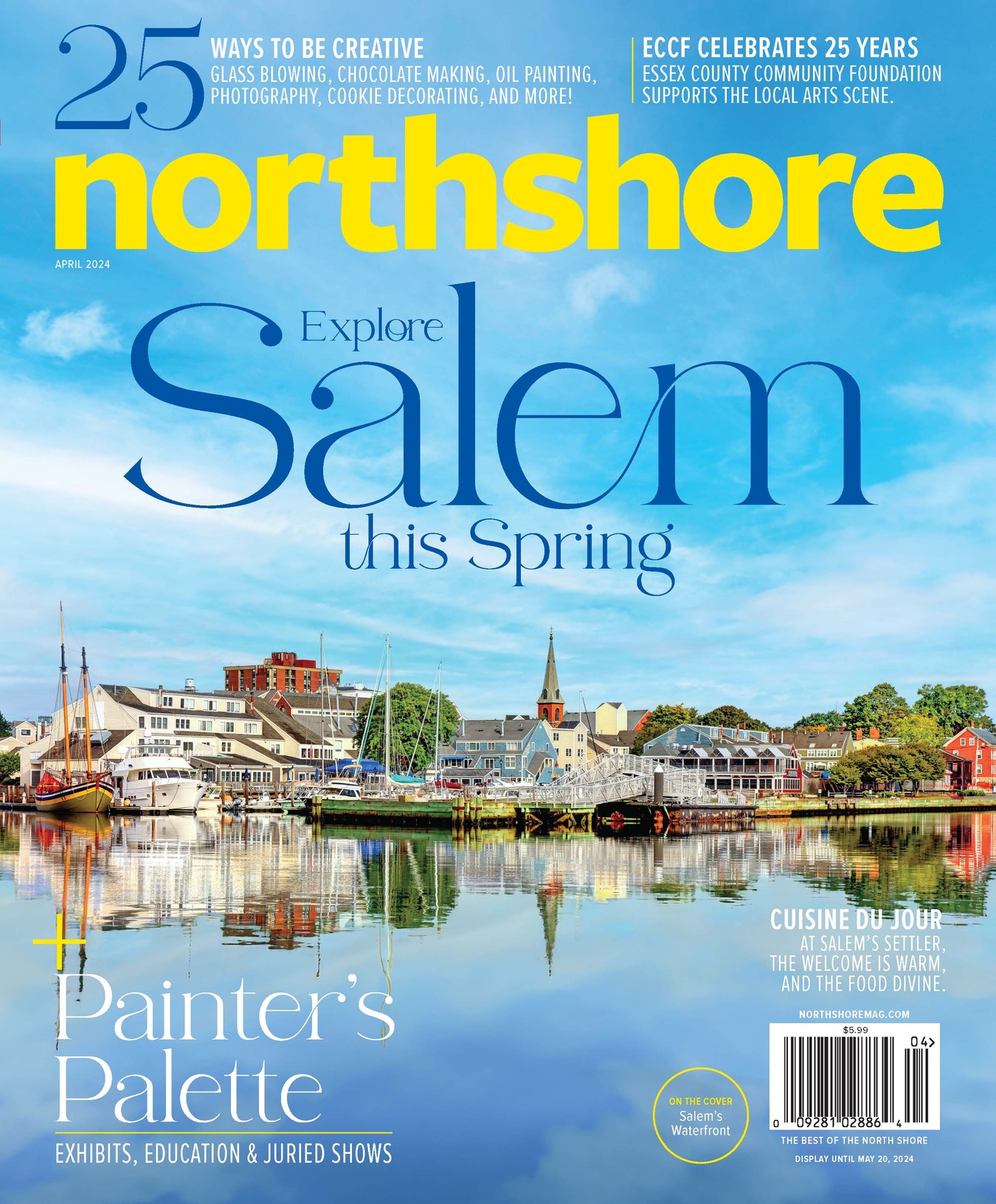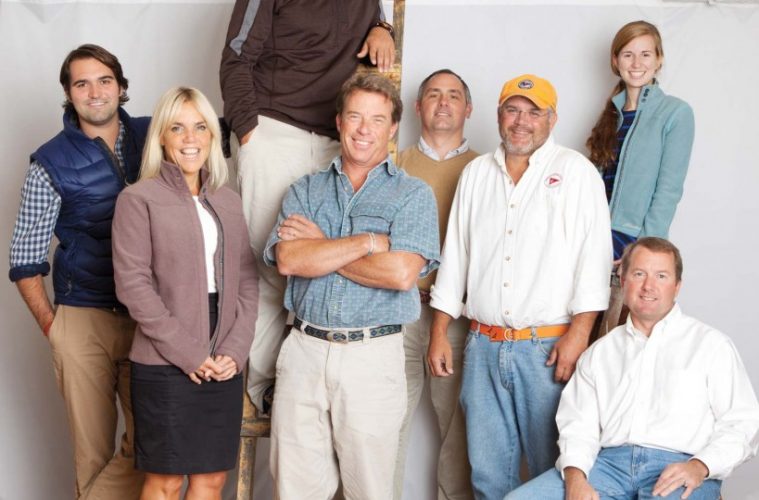Two makers of top-shelf outdoor apparel and gear— one’s specialty is marine, the other, mountains— make their home on the Marblehead waterfront.
From fishing to yachting to the early days of the U.S. Navy, Marblehead and boating have long gone hand in hand. So it’s only fitting that one of the country’s most notable sailing and marine apparel brands would find a home in a Marblehead boatyard a few doors down from The Landing Restaurant. What might come as more of a surprise is that the same boatyard is also home to an equally iconic Western mountain clothing brand with roots in Jackson Hole, Wyoming.
On the surface, the two brands—Atlantis WeatherGear, for the boating lifestyle, and Cloudveil Mountain Works, for the mountain lifestyle—are very different. Atlantis makes clothing and outerwear for boaters and sailing enthusiasts—think people who love racing around buoys and chasing striped bass. Cloudveil is synonymous with the mountains, making gear for skiing, hiking, and backcountry enthusiasts. But both have found a home with RockHopper Group, LLC, a small company that has been making a name for itself in the technical apparel market for the past five years. And both have something else in common: the enthusiasts themselves. These are people who love the outdoors and who expect high performance from their clothing and outerwear.
“I think there are a lot more similarities between the two brands than there are differences,” President Charles “Chaz” Bertrand says. His Marblehead office in the Atlantis/Cloudveil headquarters is on the third floor of a building that overlooks Marblehead Harbor and is adjacent to a boatyard on Front Street. Downstairs are other nautical businesses like Jordan’s Marine, The Forepeak, and Eastern Yacht Sales.
By coming to Marblehead, Atlantis WeatherGear seems to have come home. It’s not only located in the yachting capital of America, but it’s also helmed by chief marketing officer Bill Lynn—an accomplished competitive sailor—and Bertrand, a sailor himself and former Navy diver.
Before finding its place in Marblehead, though, Atlantis had faded from its former glory. First established in Boston in the 1970s, Atlantis spent much of the 1980s as the #1 brand of sailing apparel in North America, says Lynn. During the following years, though, ownership of Atlantis bounced around between several companies, including the Stratham, NH-based Timberland and the Chelsea-based CranBarry. Eventually, the innovation and technology that had defined the brand began to slip, and Atlantis lay dormant for years. Or, as Lynn says, the brand “lost its mojo.”
Meanwhile, Bertrand was working in Boston, looking to make a career change after spending years in investment banking. “I had not in a million years thought that going into the apparel or branding world was the next step for me,” Bertrand says. But a colleague happened to play golf with Atlantis’s current owner, and the conversation turned to a desire to sell the brand. That colleague told Bertrand about the business opportunity, knowing Bertrand’s interest in sailing.
Despite his lack of experience in the branding and apparel industry, Bertrand is a self-professed “technical apparel geek— a gear head” who’d been sailing with his family for most of his life. So he recruited Lynn, a branding expert whose “reputation in sailing sort of preceded him,” Bertrand said. Together, they purchased the brand and began working on Atlantis’s rebirth.
The team relaunched Atlantis in 2007, with the goal of reviving the beleaguered brand and “re-authenticating” it in the performance sailing world. It was a task that Lynn and Bertrand were uniquely positioned to tackle. As sailors themselves, Lynn and Bertrand were able to take advantage of their connections in performance sailing. Lynn says they were able to “tap into some of the best sailors in the world” and not only ask them what they want in their gear, but actually have them test it, too.
“I spend an awful lot of time racing boats, offshore [and] inshore, and we all have very strong opinions about what we want in a piece of gear,” Lynn says. He reaches over to an Atlantis jacket hanging on a rack and holds its sleeve in the air. “We sit around in this room and have fist fights over whether this is the right kind of cuff. Whether it should have a Velcro closure…should the zippers go up or down?” Moreover, being Marblehead sailors themselves allows the folks at Atlantis to tie the brand to a place. Marblehead is synonymous with boating, the ocean, and the marine lifestyle. So for the team at Atlantis, reclaiming the brand’s “mojo” became about more than once again making it relevant and exciting for the sailing community. They also sought to tie Atlantis directly to Marblehead itself. In that way, it could become relevant for more people, not just the ones who spend their weekends racing around buoys.
“If you sort of root it in the Marblehead story, then all of sudden, it becomes something that if it’s relevant in Marblehead, it’s relevant for Atlantis,” Bertrand says. “If you like chasing striped bass, if you like just taking a walk on the beach or over the causeway,” then the brand means something to you, too, he says.
From which playbook did the Atlantis team draw when they were busy tying their brand to a place? Oddly enough, it was from Cloudveil, which has been deeply tied to Jackson Hole since it was founded there in the late 1990s. “More often than not, it was Cloudveil that was that reference point that we chose,” Bertrand says.
Long before Bertrand had any business associations with Cloudveil, before he started to bring Atlantis back to life, Bertrand was a devotee of the Cloudveil brand. After visiting Jackson Hole in 2001, he “easily became their biggest fan and/or customer east of the Mississippi for the next five or six years.” He says he still has the first jacket he ever bought from Cloudveil 12 years ago.
“It’s amazing how well it’s held up, and I wear it pretty much every time I go skiing,” he says. He was also intrigued by the way Cloudveil was so deeply associated with Jackson Hole and the hardcore backcountry mountain lifestyle that the Wyoming town represents. The brand seemed to carry within it an element of the West itself, something rugged and pioneering. The team wanted that kind of association for Atlantis, too.
Both brands “come from a place where the lifestyle revolves around the activities that the gear is designed for,” Lynn says. “In the case of Cloudveil, it’s Jackson hole. In the case of Atlantis, it’s Marblehead.”
Bertrand says they got invited to the Cloudveil table in February 2010, when a friend of his was among the principals in talks to buy the brand. The folks at Rock- Hopper were recruited because of their experience in the technical apparel space with Atlantis. That led to them having a role operating the brand. At first, they were only the online face of Cloudveil, but within a couple of years, they were responsible for everything, including product development. “We were doing all of the operations at that point; we just didn’t own the brand,” Bertrand says. “It was like renting as opposed to owning your apartment.”
Now, they’re in the process of buying Cloudveil; at the time of their interviews with Northshore, they were in the “ninth inning” of the acquisition, says Bertrand. Last fall, the company also opened a retail space for Atlantis and Cloudveil called the A&C Store on Washington Street in Marblehead.
On the surface, Cloudveil and Atlantis seem very different. But they’re two sides of the same coin—technical apparel brands that are highly functional for specific outdoor activities. Atlantis apparel is meant to keep you warm and dry while withstanding the abuse of a marine environment. Cloudveil provides cold weather mountain gear that ranges from light base layers made from antimicrobial fabrics that wick away moisture to skiing jackets that will hold up at 20-below.
Over the years, Atlantis has successfully re-authenticated itself among performance sailors, even sponsoring the U.S. Olympic sailing team. But over the past several decades, brands like Cloudveil and Atlantis have moved beyond the slopes and sloops and into everyday wear. People wearing Atlantis gear can easily move from the deck of a ship to the bar at Maddie’s without looking like a stereotypical slicker-clad fisherman, says Bertrand. And Cloudveil’s softshell jackets look as natural on the streets of Boston as they do in the foothills of the Rockies.
“When particularly [our clothing is] being worn in the city, both of these brands should be speaking a little bit about who you are on Saturday and Sunday, or where you’d rather be,” Bertrand says. “If someone sees you wearing it, there’s a sort of understanding that you spend a fair amount of time on the water or in the mountains, that you’re an active enthusiast.”
In that respect, Cloudveil and Atlantis are also aspirational brands. Just as not everyone who wears Nike is a professional basketball player, not everyone who wears Atlantis and Cloudveil apparel is the kind of hardcore enthusiast that the brands target. And therein lies their strength: They’re relevant to the hardcore people and attractive to everyone else.
“People who want to wear the stuff may not necessarily be out there wandering around the backcountry in the Tetons, or out there beating the crap out of themselves in the ocean,” Lynn says. Atlantis and Cloudveil prove that good looks and functionality aren’t mutually exclusive. But in the end, the key to their success will always be authenticity.
“Authenticity is something that you either have or you don’t,” Lynn says. “You can’t create it. And if you lose it you can’t get it back.”

